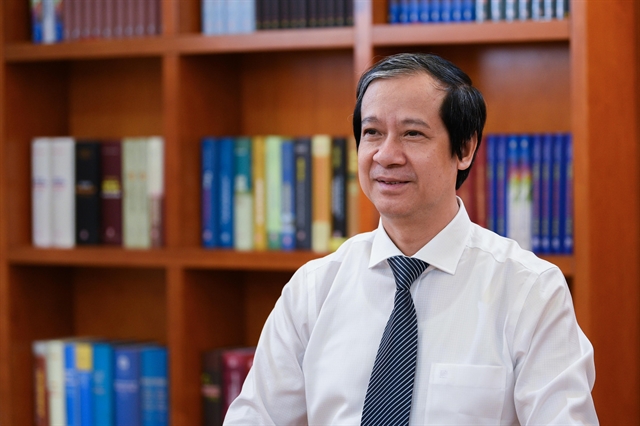.jfif) Opinion
Opinion

 |
| Students sing the national anthem at the school opening ceremony. VNA/VNS Photo |
The 2025–2026 academic year has opened with unprecedented opportunities as the Politburo of the Việt Nam Communist Party on August 22, 2025 issued a resolution dubbed "Resolution 71" on breakthrough development in education and training, carrying expectations and extensive preferential policies. Ahead of the new school year, Minister of Education and Training Nguyễn Kim Sơn answers the press about opportunities and challenges for the education sector.
The Party and the State have adopted many preferential policies for education, several of which will be implemented from this school year. Particularly significant is the Politburo’s Resolution 71 on breakthrough development in education and training. Could you say about the opportunities and challenges ahead?
The education sector faces an unprecedented opportunity this year, receiving greater attention and expectation from the Party and the State than ever before.
Central to this momentum is the new Politburo resolution on breakthrough development in education, providing the foundation to accelerate reforms and set out a fresh vision in an era of rapid global change driven by digital technology and artificial intelligence.
It sets key goals to advance Việt Nam’s education, offering a historic chance to affirm its role in national development. The ministry is preparing action plans to implement the resolution from the start of this school year.
Alongside this, a national target programme for education and training is being prepared. Four key laws – on teachers, on general education, on higher education, and on vocational education – have been or are expected to be promulgated this year, laying a solid legal foundation for a modern and effective system. Digital transformation, the use of artificial intelligence and the promotion of STEM education are also opening new opportunities.
Yet challenges remain. Operating under a two-tier local government system will require strong management of organisational and staffing changes. Ensuring equity, curbing rampant private tutoring, managing teacher recruitment and rotation and guaranteeing genuine universal access to education must all be addressed decisively. The task of absorbing and effectively using large volumes of investment in the coming years will also demand great effort.
The 2025–2026 academic year will be the first in which the sector operates under the two-tier local government model. What solutions has the ministry prepared?
To ensure smooth operations, the ministry has issued two decrees and six circulars on decentralisation and delegation of authority in education. We have also held seminars, set up hotlines and created mechanisms to resolve difficulties at the local level.
Training materials and handbooks have been prepared for commune/ward-level education managers and six inspection teams have been deployed to 15 provinces. Moving forward, we will continue to review legal documents, strengthen professional guidance and complete the sector’s data systems.
For effective implementation, the People’s Committees [Administrations] must promptly resolve challenges at commune level and, where necessary, deploy specialised staff from departments or schools to assist communes/wards lacking expertise. IT and digital transformation should be fully used to ensure smooth coordination.
Departments of Education and Training should also work with other agencies to provide intensive training for commune/ward-level officials and guide the creation of inter-school and inter-commune/ward professional clusters to support teacher development – a role previously handled by district offices.
 |
| Minister of Education and Training Nguyễn Kim Sơn. |
Many students and parents are concerned about private tutoring, especially as full-day education has been adopted in primary and secondary schools. How will this be managed?
We hold the view that while extra lessons may reinforce knowledge, they contribute little to holistic human development. The negative consequences of uncontrolled tutoring require continued and determined correction.
In 2025–2026, the ministry will direct localities to issue clear regulations while requiring schools to deliver the national curriculum effectively.
Following the Prime Minister’s directive on full-day schooling [dubbed Directive 17], schools have been instructed to make detailed plans specifying resources, lesson content, student groups and teacher allocation. Differentiated teaching is required – nurturing gifted students, supporting those at risk and preparing pupils for final examinations.
Afternoon sessions, including supplementary lessons, will follow Directive 17, with funding mainly from the State budget and regulated social contributions. The ministry will also work with the Ministry of Finance and localities to develop mechanisms for full-day schooling.
This year’s school opening ceremony was the first to connect all levels of education nationwide, from preschool to university, via online and live broadcast. What message would you like to deliver?
The 2025–2026 school year began in a special context as the nation celebrated the 80th National Day and the education sector marked 80 years of tradition. This was both a moment to honour past contributions and to reaffirm education’s mission of shaping people and building the nation in a new era.
With 52,000 schools nationwide connected online and joined by Party and State leaders, the ceremony reflected confidence and determination to raise Việt Nam’s education to new heights. The keyword this year is 'implementation', carrying out the Party and State’s policies and the sector’s key tasks.
Education is a long-term cause that demands vision, perseverance and responsibility. I call on managers, teachers, staff and students to unite, prepare well and make this school year successful. VNS




